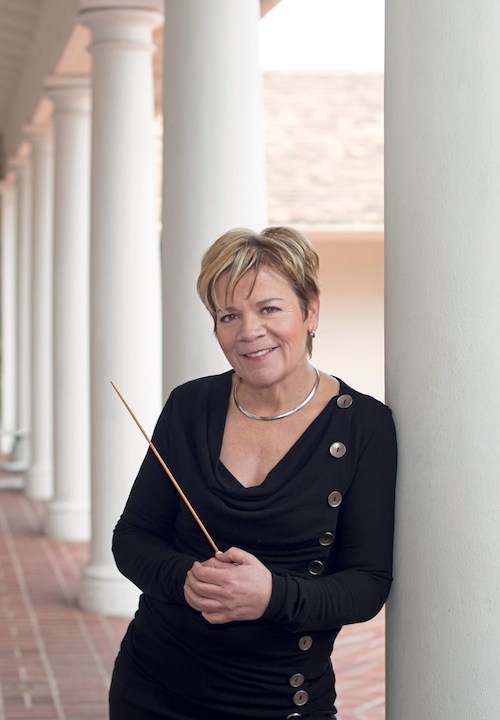ACO, Alsop, and Koh search movingly for “Sanctuary” at Zankel Hall
One expects a forward-facing group like the American Composers Orchestra to tackle the questions of our time, but at Friday’s concert led by Marin Alsop in Zankel Hall, the expressive stakes seemed exceptionally high.
Titled “Sanctuary,” after the violin concerto by Lisa Bielawa that constituted its second half, the program of five premieres—two world, three New York—fairly swarmed with the psychological, political and spiritual concerns of right now.
Who would have thought, when this concert was being planned a year or more ago, that the incident that prompted the Bielawa work—the U.S. government’s “Muslim travel ban”—would be overtaken this month by a vastly greater crisis? Or that, while millions of women and children were fleeing their invaded country, a concert of music by female composers would hold out visions of sanctuary?
Just when it seemed we were past drawing conclusions based on the sex of a composer or a performer, events in Ukraine became a forceful reminder of how the world has turned to women for safety and comfort when war and chaos was loose in the land.
The only overtly political piece on the program was the opener, Anna Clyne’s buoyant Restless Oceans, composed in 2020 for Alsop to conduct with an all-female orchestra, at the World Economic Forum Annual Meeting in Davos. In its brief three minutes, what might be called a Fanfare for the Economic Woman offered thudding Rite of Spring-style rhythms, a tender flute melody over burbling winds, and a crescendo that was literally a hoot, with the players vocalizing, stamping their feet, and bounding out of their chairs at the final chord.
After that bold assertion, the program turned inward for the rest of the evening, or at least viewed events from a distance, as in Hannah Kendall’s 2020 piece Tuxedo: Vasco ‘de’ Gama. Contemplating the silkscreen artwork Tuxedo by Jean-Michel Basquiat, the composer noted its web of historical references, particularly to the Portuguese explorer Vasco da Gama (his name misspelled by the artist), whose voyages to Africa and India at the turn of the sixteenth century ushered in centuries of colonialism and globalization.
Kendall, like all the evening’s composers (except Clyne, who was sidelined by Covid), was present to introduce her piece briefly in a chat with Alsop, who described Tuxedo as “packed with inspiration.” At barely six minutes’ duration, it was surely packed with ambition, as allusions to sea voyages and Basquiat’s African heritage crowded together in urgent dissonances, sparkling percussion, a plaintive violin solo, references to blues and spiritual songs, and finally a broad expanse of calmly accumulating motives. Alsop managed all this compellingly from the podium.
Imagery of the ocean figured literally in the world premiere of Paula Matthusen’s Prophecy in Reverse, as excerpts of Danielle Vogel’s poem “Sea Margin: a prophecy in reverse” were projected above the orchestra during the performance. Composed in tandem earlier this year, poem and piece combined to weave a contemplative atmosphere anchored by a single pinging note high in the harp, as a soft cello melody (“drifts of nourishing darkness”) yielded to temple-like percussion (“exchange/tidal resonance”) and a brighter dance (“leave the shallows now”).
Exactly what prophecy was being reversed in this piece wasn’t clear at first hearing, although on this evening it was easy to imagine stressed inhabitants of Vasco da Gama’s era of exploration/exploitation turning back to the sea for more ancient solace.
Composed this year and making its world bow Friday, Dai Wei’s Invisible Portals evoked a different place of refuge she heard about when traveling in Tibet, “a legendary realm of peace and prosperity governed by wisdom and passion” called Shambhala. Turning Vasco da Gama in yet another direction, the composer imagined “adventurous portals” leading to “multicultural and multidimensional conversations…beyond time and space.”
Actual sounds of Tibet led off the piece as the composer, seated at a laptop in the orchestra, made temple chants and throat singing emerge from a cloud of wispy trills and glissandos. Soon a minimalist chugging beat arose in the orchestra that would continue, forte or in the background, through percussion-driven climaxes, more echoes of the Rite in a ticking bassoon, snatches of melody amid emphatic brass chords, and a crescendo to an energetic finish. Whatever other people’s Shambhalas are governed by, in Dai Wei’s, passion led the way.
Addressing the concept of “sanctuary” during the summer of 2018, Lisa Bielawa was nothing if not thorough. As an artist-fellow of the American Antiquarian Society, she dug through “broadsides, poetry, political tracts and speeches, novels and children’s literature” in search of the word and its many implications. The result was Sanctuary, a concerto in three movements composed for violinist Jennifer Koh, who performed the work’s New York premiere Friday.
In Koh’s agile but never showy rendering, the first movement, titled “Speak,” outlined the quest for a safe place, with the soloist in dialogue with a sympathetic orchestra, or running hither and thither, and often playing alone.
The second and longest movement, “Threshold,” took its title from an encounter with Abraham Lincoln that the anonymous writer described as “a threshold of a sanctuary too sacred for human feet.” Compounded of melodies to verbal texts and allusions to the four-note B-A-C-H motive and a moody Chopin etude, the music evoked a passage from Uncle Tom’s Cabin referring to “that inarticulate sanctuary of music” where one finds “a language in which to breathe.” Koh mused and danced in double stops as Alsop deftly dialed the orchestral tutti up and down.
The brief finale, “Breathe,” celebrated the relief of finding sanctuary to a swinging Bachian 9/8 meter, the soloist at last exulting in a fast scale or two. And thus, this unexpectedly ultra-relevant concert came to—well, at least a hopeful conclusion.



